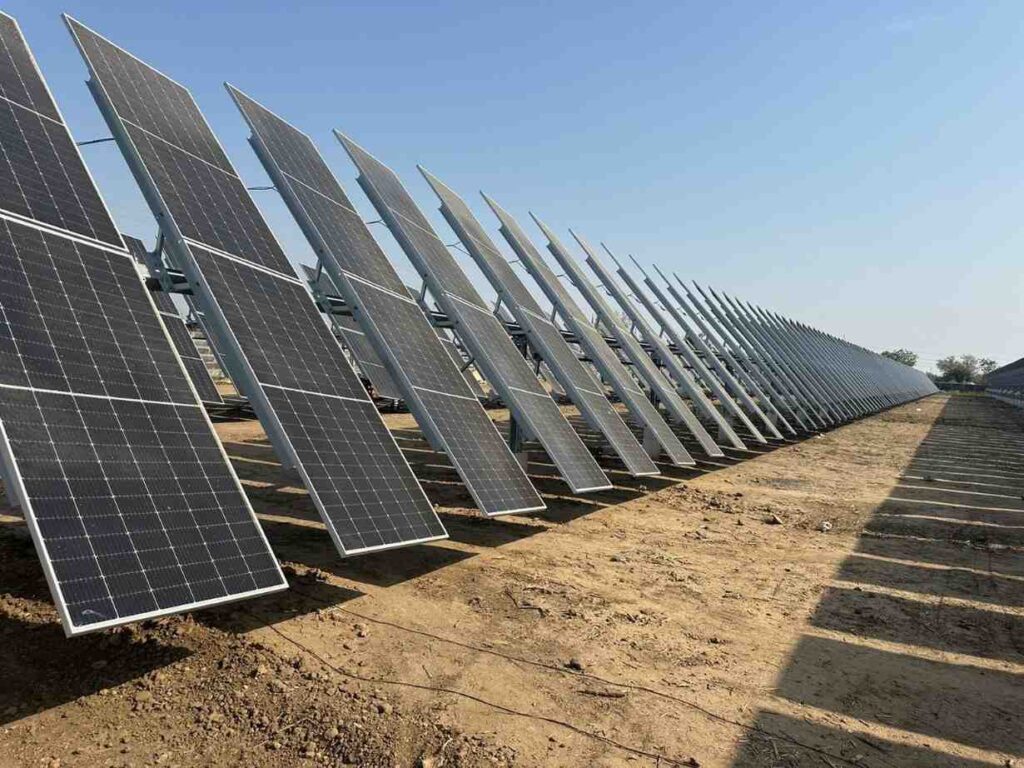Modern energy solutions increasingly require solar technology to play a central role because the world is adopting sustainable power generation methods. This paper examines solar technology aspects and its fundamental position in contemporary energy solutions through the lead of Mehsana-based GRE Renew Enertech Limited and other companies.
The Fundamentals of Solar Technology
Solar technology encompasses a range of systems and techniques used to harness sunlight and convert it into usable energy. The most common forms include:
- Photovoltaic (PV) Systems: Solar panels based on semiconductor materials transform sunlight exposure into electric power through photovoltaic (PV) systems. The development trajectory of PV technology has produced major advancements which drove its increasing popularity among residential and commercial and industrial buildings.
- Solar Thermal Systems: Solar Thermal Systems function by collecting sunlight to heat water which subsequently heats buildings through space heaters or water heaters. High levels of solar insolation make solar thermal systems especially productive in their designated regions.
- Concentrated Solar Power (CSP): CSP systems apply mirrors or lenses to focus light beams onto specific areas which produce high-temperature heat to activate electric turbine production. This solution matches the needs of building power plants for large-scale operations.
- BIPV (Building-Integrated Photovoltaics): The Building-Integrated Photovoltaics technology combines solar power generation with traditional building materials through windows and exterior facade components. BIPV technology adds visual appeal to buildings and helps satisfy their power requirements.
Benefits of Solar Technology
- Renewable Energy Source: Solar energy functions as a sustainable renewable power source because it demonstrates indefinite supply and lack of depletion. Countries that deploy solar power technology obtain two benefits: they decrease their carbon emissions and fight against global warming.
- Energy Independence: Through solar technology people along with commercial entities can produce their electricity while breaking free from traditional electricity suppliers. Such capability offers essential benefits to locations that face challenges with energy security.
- Cost Savings: The installation of solar energy systems creates steadily declining energy expenses which save money over time. The combination of cheaper solar panel prices and better performance is driving solar-generated profits up all the time.
- Job Creation: Kinds of work emerge due to solar industry expansion in manufacturing facilities and during installation and maintenance activities and through solar energy research initiatives. The growth of GRE Renew Enertech Limited along with similar companies creates rising employment opportunities which boosts the need for trained personnel in the solar technology field.
- Technological Innovation: Advancements in solar technology, such as improved battery storage systems and smart grid integration, enhance the efficiency and reliability of solar energy. Companies that invest in research and development contribute to these innovations.
The Role of GRE Renew Enertech Limited in Solar Technology Advancement
GRE Renew Enertech Limited, based in Mehsana, is at the forefront of solar technology implementation in India. The company specializes in large-scale solar park development, rooftop installations, and ground-mounted projects, focusing on maximizing energy output through advanced technology.
- Project Development: GRE is in entire solar project development phases starting from site selection through operational stages. The company applies a complete method that leads to efficient project execution while maintaining sustainable practices.
- Quality Assurance: Quality Assurance stands as a priority throughout all project aspects at the Company because they implement high-grade materials combined with advanced technologies to achieve peak performance. The dedication to delivering the best quality work results in solar installations which provide dependable and durable operation.
- Customer-Centric Solutions: The company delivers individualized energy solutions because GRE specializes in creating customized energy approaches that serve separate client needs. The company serves different types of clients thanks to their knowledge of solar applications for homes and businesses and industrial settings.
- Sustainability Commitment: As the leading solar industry company GRE maintains a strong dedication to environmentally friendly practices together with sustainability goals. The project designs from GRE aim to become part of the natural environment while providing power to the local community.
- Community Engagement: GRE dedicates its resources to reach local communities through collaborative programs that educate about solar energy benefits and stimulate the technological adoption process. Their efforts in building partnerships enable them to provide educational resources that spread knowledge about solar technology benefits.
Challenges Facing Solar Technology
Despite its many benefits, solar technology also faces several challenges that need to be addressed:
- Intermittency: The availability of sunlight makes solar energy generation intermittently operational. The stability of energy supply requires energy storage systems because these systems maintain stability during moments when sunlight is low.
- Initial Costs: The starting expenses associated with solar power installations maintain their status as a hurdle for both homeowners and business owners despite recent price drops in solar technology equipment. Government funding programs together with financial reward systems work to ease the costs of adoption for solar energy projects.
- Land Use: The deployment of extensive solar farm operations needs broad stretching land bases that produces disputes regarding how existing territories are used. Solar power solutions which integrate multi-purpose farming techniques alongside rooftop deployment systems provide a resolution to overcome this problem.
- Technological Advancements: Keeping pace with rapidly evolving technology can be a challenge for developers. Continuous training and development of the workforce are necessary to harness new technologies effectively.
- Regulatory Barriers: Inconsistent policies and regulations can hinder solar technology adoption. A stable and supportive regulatory environment is crucial for encouraging investment in solar projects.
The Future of Solar Technology
The future of solar technology looks promising, with ongoing advancements expected to further enhance its efficiency and accessibility. Key trends include:
- Increased Efficiency: The focus of research aims to boost solar panel capabilities thus generating higher energy levels from installations with smaller dimensions.
- Energy Storage Solutions: Energy storage solutions that include more efficient battery systems will solve the intermittency problem with solar energy so it can better connect to the power grid.
- Smart Technology Integration: The incorporation of smart grid technology will optimize energy distribution and usage, enhancing the overall efficiency of solar power systems.
- Wider Adoption: As awareness of climate change and the benefits of renewable energy grows, more homeowners and businesses will consider solar technology, contributing to its expansion.
- Global Collaboration: Solar technology advancement depends heavily on international partnerships which will drive its progress. International cooperation will speed up the research process alongside development of new solutions along with their expedited deployment.
Conclusion
Modern energy solutions have solar technology as their foundation which provides multiple benefits that reinforce worldwide sustainability targets. The solar park development leader GRE Renew Enertech Limited and other advanced solar application enterprises demonstrate how solar energy transforms our future into a more sustainable direction.
The adoption of solar technology along with stakeholder investment in solar development creates opportunities for sustainable power systems and enables the resolution of primary energy problems and new employment options.

